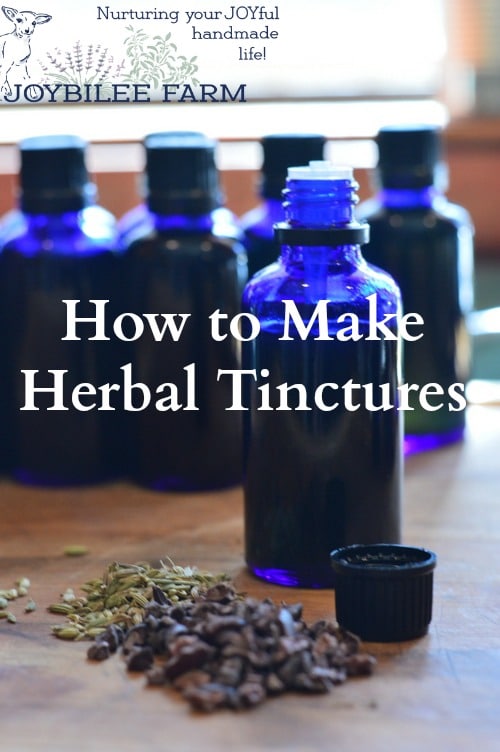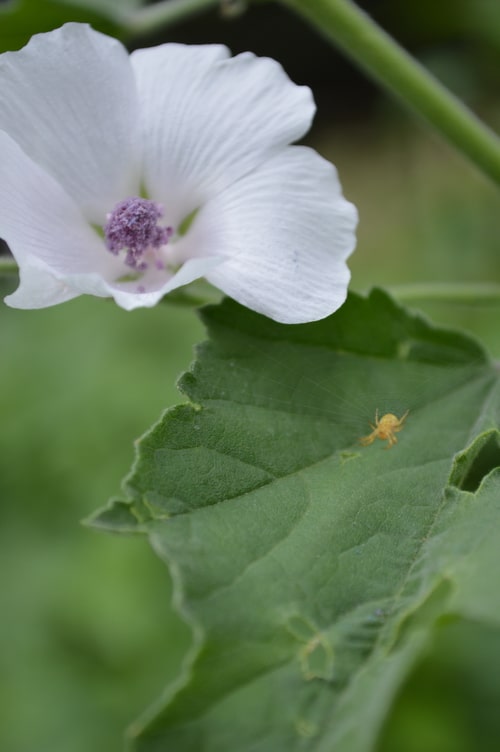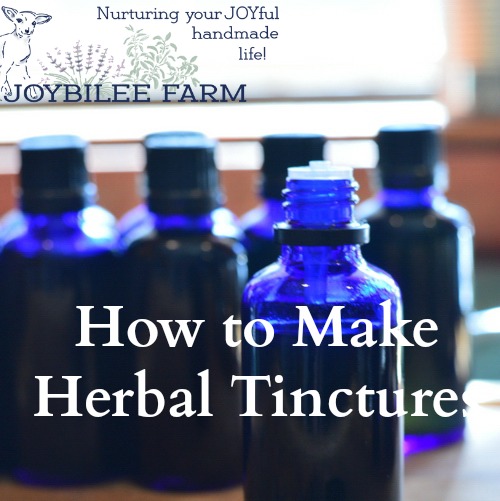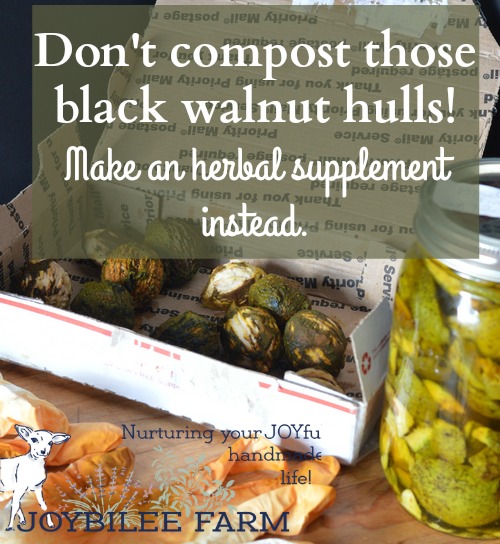Making herbal tinctures is one of the easiest ways to preserve the potency of your herbal harvest. Tinctures are easy for a beginner to make, yet they are the stand by herbal remedy for professional herbalists.
Tinctures made with alcohol and dried herbs have a long shelf life. They can last for decades without a decrease in potency, provided they are protected from light and heat.
Alcohol and water are universal solvents. When you make a tincture using vodka or another distilled alcohol, the alcohol percentage is described as either a percentage of the alcohol content or as “proof” What does that mean? Well in Canada most distilled spirits are 40% alcohol. This means they are 60% water. So if you make a tincture using vodka and dried plant material using Canadian vodka your tincture will be 40% alcohol and 60% water. Both the water and the alcohol will dissolve the desired constituents of the herb you are working with.

If your alcohol is labeled as proof rather than a percentage of alcohol, the proof is double the actual percentage of alcohol. So if you purchase alcohol described as 100 proof, it means that it is 50% alcohol and 50% water. 80 proof would be 40% alcohol and 60% water.
In the US and in some Canadian provinces Everclear is available and is the preferred alcohol to use when making tinctures using fresh plant material. Everclear is 190 proof or 95% alcohol. Since fresh plant material will dilute the alcohol content in the tincture, using a higher proof alcohol increases the amount of the desirable constituents that can leach into the solvent, while ensuring that the tincture has a long shelf life. Tinctures made with Everclear will last indefinitely.
(Added for clarity) When using Everclear with dried plant material, the Everclear should be diluted by adding distilled water according to the percentage of alcohol recommended for the herbal tincture that you are making.
When you shouldn’t make an alcohol tincture
- There are a few plant constituents that dissolve better in water than in alcohol. These are better used as a tea than as tinctures.
- Saccharides and other carbohydrates dissolve better in water than alcohol. Mushrooms are high in oligosaccharides and require a 2 step tincture process that involves high proof alcohol (Everclear), and a hot water soak.
- Minerals like calcium, magnesium, and iron do not dissolve easily in alcohol. Water and vinegar are the best solvents for minerals. While some herbs that are high in minerals are made into alcohol tinctures, this is to extract other constituents in the plant rather than the minerals.
- Nettles, chickweed, violet, red clover, dandelion leaf, and the seaweeds are high in minerals and better preserved in vinegar or used as a nourishing infusion. Fire cider is an example of a vinegar based tincture. Vinegar based tinctures have a shorter shelf than alcohol-based tinctures but are easier to incorporate into food. Use them in salad dressings or as additions to bone both.

- Alcohol doesn’t effectively dissolve the mucilage in some herbs. If you are taking an herb for its soothing demulcent properties, you’ll want to take them in herbal teas rather than use an alcohol tincture. Herbs that are high in mucilage include comfrey root, marshmallow, slippery elm, corn silk, licorice, and violets.
- When you are giving herbs to babies it’s better to avoid alcohol and use water infusions instead. Young children should minimize alcohol intake.
- Those with liver disease, alcohol allergies, or a history of alcoholism should avoid alcohol-based tinctures.
When alcohol tinctures are the best choice
- Alcohol is excellent at extracting resins, while water is not. Plants that are high in resins include pine, spruce, balsam poplar/black cottonwood, rosinweed, frankincense, myrrh, and cannabis. To extract plant resins you’ll want to use the highest proof alcohol you can obtain. 40% alcohol vodka will make a mess of pine resin because the alcohol content isn’t high enough to break down the resin. If you can’t get Everclear where you live, resins can also be infused in oil to preserve their beneficial compounds.
- Essential oils are better extracted with alcohol than with water. Plants that are highly aromatic like sage, rosemary, and lavender are good choices for an alcohol-based tincture.
- Tinctures are convenient for travel. They are high potency, compact, and portable. You can fly with tinctures in your carry-on luggage, provided that they are packaged in bottles that are 2 ounces or less, and are labeled accordingly.
- With potent low-dose botanicals, tinctures allow you to better control the dosage.

Can I share my tinctures?
Provided that the herb used in tincture making is a legal herb, it is also legal for you to share your tinctures with family and friends. There are specific laws that apply when selling your tinctures in a retail setting. In both the US and Canada, tinctures made for commerce must comply with specific labeling regulations, must be created in a commercial, inspected facility, and must meet certain standards of potency. This is beyond the scope of this article.
I highly recommend enrolling in an online herbal course in order to understand the full scope of making herbal medicine, if you are considering selling your herbal tinctures in your business. The Chestnut School of Herbal Medicine’s Herbal Immersion Course or The Herbal Academy’s Entrepreneur Herbal Course can guide you through the process of turning herbal medicine making into a business.
How to make herbal tinctures using the folk method
You’ll need:
- Dried or fresh plant material
- Vodka with at least 40% alcohol for dried herbs or 95% alcohol for fresh herbs
- A wide mouth quart canning jar
- A stainless steel funnel
- A stainless steel strainer
- A cloth for pressing out the herbs or a potato ricer
Method:
- Wash and sanitize your equipment.
- Place your chosen herb in the Mason jar. If you are using dried herbs fill the jar half full. The dried herbs will absorb the alcohol and swell in the jar. If you are using fresh herbs, fill the jar completely with the herbs, then cover the herbs with alcohol.
- Use a chopstick to displace any air bubbles. Add more alcohol if necessary to fully cover the herbs.
- Cap tightly and label the jar with the contents and the date. Don’t forget to label, in a month you may not remember what you put in the jar and it will look entirely different.
- Every day or as often as you think of it, shake the jar to evenly distribute the herb in the alcohol.
- After 4 to 6 weeks your tinctures are ready to strain.
To strain the herb, line a fine mesh sieve with a cloth. Place the sieve over a glass bowl to catch the liquid. Once most of the tincture has dripped through the cloth into the bowl, twist up the cloth to squeeze out as much tincture as possible. Alternatively, you can press the plant material in a potato ricer to get the last drops of good medicine out of the plant material.
Pour the tincture into colored glass bottles. Label and store in a cool, dry, dark cupboard. Tinctures have an indefinite shelf life if made with high percentage alcohol.
I can only get 40% alcohol can I still make tinctures with fresh herbs?
Yes. Use the alcohol that you have, but know that the shelf life of the tincture may not be as long because the water in the fresh plant matter will dilute the alcohol further. Generally, if the tincture is at least 20% alcohol it will remain stable at room temperature.

Echinacea Tincture
Yield: 16 ounces
Ingredients:
- 2 cups of dried Echinacea roots, chopped well
- 3 cups of vodka (40% or higher)
Method:
- Place the Echinacea in a wide mouth canning jar.
- Pour the vodka over the roots so they are fully covered.
- Cap the jar tightly.
- Label and date the jar. The roots will expand as they absorb moisture.
- Check frequently over the next few days and add more vodka as necessary to keep the roots covered.
- Shake the jar once a day, or as often as you think about it to distribute the alcohol in the herbs.
- After 6 weeks strain the herbs through a fine mesh sieve and press the herbs through a potato ricer to get as much of the alcohol out of the herbs as possible.
Pour the herbs into colored medicine bottles. Label and date the container. Echinacea tincture will last many years.

Looking for the best tinctures to have on hand?
Echinacea Tincture encourages the immune system and reduces many of the symptoms of colds, flu, and some other illnesses and infections.
Don’t Compost Those Black Walnut Hulls! Make a Black Walnut Tincture Instead. Use the green hulls from black walnuts for its antifungal properties or as an external iodine supplement.
Elderberry Tincture can be one incredible healing powerhouse. When used externally elder can help heal wounds and when taken internally it can help fight colds, cases of flu, and respiratory illnesses. Get specific directions for making elderberry tincture at Homespun Seasonal Living.
Thyme Tincture helps relieve digestive complaints, including heartburn and gas. It improves halitosis and is a common ingredient in mouthwash.
This article was last updated in May 2019



Thank you for the informative read! What would you’d suggest using with dried mullein?
I have already started a white pine needle tincture with everclear. Do I need to dilute it when it’s done? Should I have used vodka? It was fresh needles ( picked about 5 days earlier but still green) but I’m not sure if needles are the same as fresh flowers and leaves?
You’ll want to dilute everclear to 40% alcohol when you are done.
Thank you so much for sharing your knowledge! So this should be safe for consumption at 40% right? In the future should I be making it with 40% vodka?
Thank you for sharing your knowledge! I’m making a pine needle tincture, is everclear good for that? I’ve had the needles in a jar for about a week now and finally got some 190 proof. It’s this ok to use?
To dilute high alcohol concentration like Everclear alcohol, I need distilled water to get 45%-50% concentration for tincture making. Is there a good water distiller for home use that someone can recommend?
Hello. My first batch of tinctures ever are about ready to be bottled. I made a beginner’s mistake and overfilled the coffee grinder when grinding and overheated some of the herbs in the grinding process. Will the tinctures still be useable?
They should be fine.
Hey,
Your artcile is so detailed about how to prepare a proper tincture. Thank you! I have one question though.
I leave in Malai and our local stores are not selling 190% proof alcohol (like everlast). On my side, I am trying to prepare the tinctures as much as closely to the recipe. I have many herbalism books which suggest certain volumes for the alcohol mentstrum. As an example for the Calendula Officinalis the recipe is 1:5 (w/v), 70% alcohol.
Our local stores sale only 35% – 40% alcohol drinks (like vodka). Is there something that I can do for that? Like divide the alcohol and volume menstrum by 2 so my final output of the above recipe is 1:2,5 (w/v), 35% alcohol? Or I just have to stick to the folk method?
I really would be grateful for any advice because that matter is a little bit confusing to me!
Thank you in advance,
Eddie.
Hi, Eddie
Use the alcohol you have. Your % alcohol will be different but your herbal remedy will still be preserved using 40% alcohol, provided the final volume of alcohol in your tincture is at least 25%. Generally Everclear is used when the herb being tinctured is fresh, to account for excess water in the herb. But if you use the volume of herb in the recipe and the alcohol you have you should be good.
My biggest problem is were to buy dark colors glass bottles to put my tinctures in. Any suggestions?
Amazon sells them. Also a place like Mountain Rose Herbs has amber glass bottles.
1. I will like to know if I can heat a tincture gently to evaporate some of the alcohol.
2. What is the best temperature to make tinctures.
Thanks.
Yes, people often put tinctures in their tea to evaporate some of the alcohol but you would do that just before serving. The alcohol is a preservation method.
Hi Chris! I am based here in the Philippines and some herbs are difficult to source here.. esp the Elderberry, Arnica, St John’s, etc.. It will cost me an arm.and leg to order overseas. Anyways, I am.planning to make a tincture for the purpose of repelling mosquitos. I will use it as a skin spray. Is this acceptable? What I have is a 100% sugarcane alcohol locally sourced.
Thank you!
Yes, I recommend you work with the herbs that are local to you. You have many medicinal herbs that are native to the Philippines. The herbs growing locally will be more potent than any that you import.
Tumeric tincture in stores is based in alcohol. Are they made with ground turmeric. Can ground herbs be used to make tinctures?
Yes they can. Some store bought turmeric is made with dried turmeric and some is made with laboratory chemicals. The ones made with turmeric are better absorbed by the body than the chemical based curcumin.
You are always better off using fresh tumeric. Add some black pepper and ginger for an amazing tonic! Only a few drops are needed daily.
– 1 inch Ginger ( or 2 small roots, grated for MBM)
– 2 tbsp Peppercorns, whole black
– 6 Turmeric, small roots
– 2 cups Everclear or Apple cider vinegar
– 1/2 cup water
Put all in glass jar and shake every few days, or use your Magical Butter Machine for 2 hours on lowest heat setting.
Is it recommended to use a high powered blender in making a herbal maca tincture and alcohol? Can this reduce the waiting period from 4-6 weeks to a week?
It would be hard to strain if it is blended. But perculation can speed up the time for making tinctures. It requires specialized equipment.
How long is too long to steep? I found one I was brewing and forgot about from a year ago, is it ok to strain and use?0
It should be fine. Alcohol is a preservative.
Thank you!
BIG WARNING: Want to share a recent experience with substituting Everclear for vodka. I make an amanita muscaria tincture as topical application for a skin condition. In the past the vodka tinc worked miracles but use of EC tinc significantly worsened the condition.
Finally remade with vodka and am now on the heal again after only 4 days use.
Research told a tale many need, to hear as Everclear is made with GMO corn. Need I say more!!!!
Hi, you said that pine is a mess if one uses a 40% alchol. Which oil do you reccomend to extract the pine and bark oil? How long does it have to soak? What would th dosage be (drops) for general auto immune disease (I struggle with arthiritis, fybromylgia, electric hyper sensitivity and had candida and cancer problems in the past). Furthermore I would like to know the same about Myhrr, Frankensence and canabis. Specifically to the canabis, is this method called a cold extraction and will it prevent the phycoactive component to be activated. I do not want to be on a trip every day – simply trying to restore my nervous system. Will there still be thc components in, and cbd? Lastly will these oils or tinctures (if you think a 40% tincture is better with any of above please do reccomend this) be good complimentary treatments with magnetic therapy? Lastly lastly, if I do make alchol tinctures, can I heat it slightly to have the alchol evaporated without evaporating the constituents. I can’t really drink alchol to pretect my liver. Apologies for any spelling errors, because of EHS I struggle to view the screen and type without looking at the screen. Thank you for understanding. I try my best.
When do you dilute the ever clear tincture with water? After you strain the herb from the ever clear?
Yes. Because you need to know the volume of everclear that you have.
What if I already made a tincture with dried herbs and everclear? How does it affect my tincture? I made one with holy basil and one with borage.
Hi Chris..I so love your awesome site, JoybileeFarm..thanks for all you share! I have made valerian root tincture once, ready to make another batch. I read if using everclear, it must be diluted with 50% water? That is what I did using dried herbs. Did I understand this article correctly.. that I can use everclear without water dilution? Thanks 🙂
If you are using dried herbs, Shirley, you will need to dilute the everclear with water to bring the tincture to the correct dilution. Everclear is potent alcohol. It does need to be diluted when making tinctures.
Thank you so much!
so, with what percent of distilled water should the 95% (190 proof) Everclear tincture be diluted after straining dried elderberries?
Yes, you are aiming for a 40% alcohol.
If I make a tincture with organic dried oregano, how will it compare with oil of oregano capsules from the health food store?
It’s different. You’ll extract different constituents of the herb with the oil extraction than you will with alcohol or water.
Great Article! I would love to invite you out to share this post and others to The Homesteaders Hop blog hop
https://www.floydfamilyhomestead.com/2016/05/18/homesteader-hop-3/